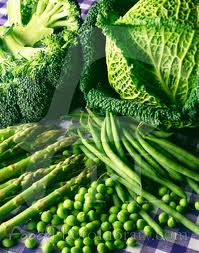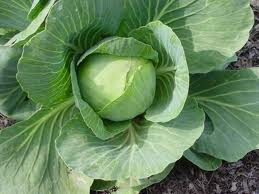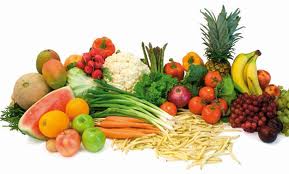Kale or borecole is a vegetable similar to cabbage, with green or purple leaves. Kale is one of the healthiest veggies you can have for dinner, lunch or breakfast. One serving, contains about 30 calories, it provides a day’s worth of vitamin C, twice the recommended daily intake of vitamin A, and nearly seven times the recommended amount of vitamin K. People who are on blood thinners such as warfarin should check with your Doctors before eating Kale because of the high contents of Vitamin K.. Vitamin K is abundant in kale but also found in parsley, spinach, collard greens, and animal products such as cheese. It is also great for juicing. Vitamin K is necessary for a wide variety of bodily functions, including normal blood clotting, antioxidant activity, and bone health. Kale’s health benefits are primarily linked to the high concentration and excellent source of antioxidant vitamins A, C, and K — and sulphur-containing phytonutrients. WebMD See Easy Ways to Prepare Kale Source of Information Medical Encyclopedia; Health magazine; The American Journal of Clinical...
Nutrition
Super Foods for Your Bones Bok Choy Calcium is plentiful in many vegetables. When shopping go for the dark leafy greens such as bok choy (seen below), Chinese cabbage, and kale. The traditional soul food favorites, turnip greens and collard, these also provide a lot of calcium. Studies show that one cup of chopped, cooked turnip greens has about 200 milligrams of calcium. Bok Choy Salmon Salmon and other types of fatty fish offer a variety of bone-boosting nutrients. They contain calcium as well as vitamin D, which assists in calcium absorption. They’re also high in omega-3 fatty acids. Fish oil supplements have been shown to reduce bone loss in elderly women and may prevent osteoporosis. Nuts and Seeds, Soy Foods, Calcium Supplements, Sunshine, Weight-Bearing Exercise, are also great source that help to strengthen the bones Sunshine Sunshine Sunlight is not a food but its a great source of vitamin D. The body produces vitamin D in response to sunlight. Without vitamin D, our bodies cannot properly absorb the calcium in foods. Cloudy weather, a northern latitude, and darker skin can interfere. Because of this, some people may choose a vitamin D supplement. The recommended dietary intake is 600 IU a day for most adults, jumping to 800 IU above age 70. Check with your Doctors before you take any Vitamin D supplements. Weight-Bearing Exercise In order to get the most out of your bone-boosting diet, you’ll want to do regular weight-bearing exercise. This includes any activity that uses the weight of your body or outside weights to stress the bones and muscles. The result is that your body lays down more bone material, and your bones become denser. Brisk walking, dancing, tennis, and yoga have all been shown to benefit your bones. [/box] Disclaimer More Information Vitamin D, Dark Greek Leafy...
Pineapple Nutrition: Tips Pineapple Nutrition: Pineapples contain bromelain, an enzyme that may help arthritis pain by reducing inflammation. They are also a good source of vitamin C, which helps strengthen your immune system. It also contains small amount Vitamin A. Read Here Health Benefits of Pineapple See the table below for in depth analysis of nutrients:Pineapple (Ananas comosus), Fresh, Nutritive Value per 100 g (Source: USDA National Nutrient data base) Principle Nutrient Value Percentage of RDA Energy 50 Kcal 2.5% Carbohydrates 13.52 g 10% Protein 0.54 g 1% Total Fat 0.12 g <1% Cholesterol 0 mg 0% Dietary Fiber 1.40 g 4% Vitamins Folates 18 µg 4.5% Niacin 0.500 mg 4% Pyridoxine 0.112 mg 9% Riboflavin 0.018 mg 1.5% Thiamin 0.079 mg 6.5% Vitamin A 58 IU 2% Vitamin C 47.8 mg 80% Vitamin E 0.02 mg <1% Vitamin K 0.07 µg 0.5% Electrolytes Sodium 1 mg 0% Potassium 109 mg 2.5% Minerals Calcium 13 mg 1.3% Copper 0.110 mg 12% Iron 0.29 mg 3.5% Magnesium 12 mg 3% Manganese 0.927 mg 40% Phosphorus 8 mg 1% Selenium 0.1 µg <1% Zinc 0.12 mg 1% Phyto-nutrients Carotene-ß 35 µg — Crypto-xanthin-ß 0 mcg...
Counsels on Diet and Food by Ellen G. White Prevailing Corruptions Due to Unrestrained Appetite Many marvel that the human race have so degenerated, physically, mentally, and morally. They do not understand that it is the violation of God’s constitution and laws, and the violation of the laws of health, that has produced this sad degeneracy. The transgression of God’s commandments has caused His prospering hand to be removed. CD 61- 62.3 Intemperance in eating and in drinking, and the indulgence of base passions, have benumbed the fine sensibilities, so that sacred things have been placed upon a level with common things.—Spiritual Gifts 4a:124, 1864 Those who permit themselves to become slaves to a gluttonous appetite, often go still farther, and debase themselves by indulging their corrupt passions, which have become excited by intemperance in eating and in drinking. They give loose rein to their debasing passions, until health and intellect greatly suffer. The reasoning faculties are, in a great measure, destroyed by evil habits.—Spiritual Gifts 4a:131, 1864 Irregularity in eating and drinking, and improper dressing, deprave the mind and corrupt the heart, and bring the noble attributes of the soul in slavery to the animal passions.—The Health Reformer, October, 1871 Let none who profess godliness regard with indifference the health of the body, and flatter themselves that intemperance is no sin, and will not affect their spirituality. A close sympathy exists between the physical and the moral nature. The standard of virtue is elevated or degraded by the physical habits. Excessive eating of the best of food will produce a morbid condition of the moral feelings. And if the food is not the most healthful, the effects will be still more injurious. Any habit which does not promote healthful action in the human system, degrades the higher and nobler faculties. Wrong habits of eating and drinking lead to errors in thought and action. Indulgence of appetite strengthens the animal propensities, giving them the ascendancy over the mental and spiritual powers. “Abstain from fleshly lusts, which war against the soul,” is the language of the apostle Peter. Many regard this warning as applicable only to the licentious; but it has a broader meaning. It guards against every injurious gratification of appetite or passion. It is a most forcible warning against the use of such stimulants and narcotics as tea, coffee, tobacco, alcohol, and morphine. These indulgences may well be classed among the lusts that exert a pernicious influence upon moral character. The earlier these hurtful habits are formed, the more firmly will they hold their victim in slavery to lust, and the more certainly will they lower the standard of spirituality.—The Review and Herald, January 25, 1881 CD 63.5...
What is vitamin B12 and what does it do? Vitamin B12 is a nutrient that helps keep the body’s nerve and blood cells healthy and helps make DNA, the genetic material in all cells. Vitamin B12 also helps prevent a type of anemia called megaloblastic anemia that makes people tired and weak. Two steps are required for the body to absorb vitamin B12 from food. First, hydrochloric acid in the stomach separates vitamin B12 from the protein to which vitamin B12 is attached in food. After this, vitamin B12 combines with a protein made by the stomach called intrinsic factor and is absorbed by the body. Some people have pernicious anemia, a condition where they cannot make intrinsic factor. As a result, they have trouble absorbing vitamin B12 from all foods and dietary supplements. [NIH] How much vitamin B12 do I need? Read more about Vitamin B12 here. Vitamin B12 is found naturally in a wide variety of animal foods and is added to some fortified foods. Plant foods have no vitamin B12 unless they are fortified. You can get recommended amounts of vitamin B12 by eating a variety of foods include the following: Beef liver and clams, which are the best sources of vitamin B12. Fish, meat, poultry, eggs, milk, and other dairy products, which also contain vitamin B12. Some breakfast cereals, nutritional yeasts and other food products that are fortified with vitamin B12. To find out if vitamin B12 has been added to a food product, check the product labels. What about Vegans how do they get Vitamin B12? Foods fortified with B12 are also sources of the vitamin although they cannot be regarded as true food sources of B12 since the vitamin is added in supplement form, from commercial bacterial production sources, such as cyanocobalamin. Examples of B12-fortified foods include fortified breakfast cereals, fortified soy products, fortified energy bars, and fortified nutritional yeast. The UK Vegan Society, the Vegetarian Resource Group, and the Physicians Committee for Responsible Medicine, among others, deny that non-animal food sources of vitamin B12 are reliable and recommend that every vegan who is not supplementing consume B12-fortified foods. According to Stephen Walsh, a UK Vegan Society trustee, and other members of the International Vegetarian Union science group (IVU-SCI), in October 2001. To get the full benefit of a vegan diet, vegans should do one of the following: eat fortified foods two or three times a day to get at least three micrograms (μg or mcg) of B12 a day or take one B12 supplement daily providing at least 10 micrograms or take a weekly B12 supplement providing at least 2000 micrograms. Disclaimer Source: National Institute of Health,, Medical Encyclopedia, Wikipedia, Medical Dictionary, Mayo...





